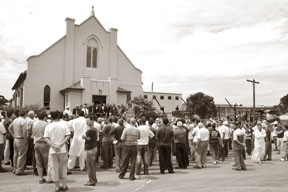|
DAILY NEWS ONLINE |
|
|
|
OTHER EDITIONS |
|
|
|
|
|
|
|
|
|
OTHER LINKS |
|
|
|
|
|
|
  |
|
|
|
|
The former development has, quite understandably, brought a measure of relief to US President George Bush who could claim that the nightmarish internal situation in Iraq is attaining a degree of normality and that a phased withdrawal of US troops from Iraq could now be even considered.
Buoyed by the relatively trouble-free election, Bush was quoted as hailing the millions of Iraqis who had voted, "defying the terrorists and refusing to be cowed into not voting."
The President went on to say that, "there's a lot of joy as far as I'm concerned in seeing the Iraqi people accomplish this major milestone on the march to democracy."
Stage one of bringing a measure of political normality to Iraq could indeed be considered as having been achieved to a degree with what seems to be the successful conduct of this poll which attracted wide participation, but the next foremost challenge would be to ensure that this polls exercise, translates into power sharing among Iraq's major religious communities.
While phase one of the democratic rehabilitation of Iraq could be considered as having been achieved to a degree, it is the successful sharing of power which would prove crucial in accomplishing this task in full.
What would need to be ensured in particular is the participation in the democratic process of militant Sunni groups and Saddam loyalist factions which have been hitherto conducting an armed, bloody rebellion against the US-backed Iraqi administration in Baghdad. Unless and until this condition is met, we are unlikely to witness a steep decline in the violence in Iraq.
However, the ethnic violence on Sydney's Cronulla beach which apparently featured white youths and those of Middle-Eastern origin should drive home to Western governments the gross inadequacy of merely meeting some formal democratic requirements in establishing and sustaining multiethnic societies.
Today it could be truly said that religion and ethnicity are proving decisive factors in social peace even in what are considered Western liberal democracies.
That the malaise of violent ethnicity is now steadily stalking even the West was brought home to us a few months back when a black youth was brutally murdered by some white youngsters in a British multiethnic township, followed by a spell of social unease. It is not without significance that this killing came in the wake of the July 17th carnage in London.
It is, therefore, plain to see that ethnic relations in the West are beginning to see some anxious times. Apparently, Western governments would need to go well beyond formal condemnation of racial violence if the democratic health and stability of their societies are to be sustained.
To begin with, law enforcement in such multiethnic polities would need to be firm. Ethnic violence should be seen as not paying, with those responsible for such friction and brands of criminality being brought before the courts and being handed down commensurate, firm punishments.
Next, States and community leaders would need to work concertedly towards greater understanding and fraternity among ethnic groups in particularly multiethnic societies.
As we have consistently advocated in this column, the world community should seriously consider and implement a "civilizational dialogue" among cultures and ethnic groups for the enhancement of inter-cultural understanding.
To be sure, such a dialogue could prove difficult to conduct amid unabated extremist violence and the rousing of emotions but the dissociation of themselves from such violence by some Western-based minority religious organisations and their leaders could help isolate the extremist few from the pro-peace majorities in Western societies and pave the way for a degree of communal harmony, through stepped-up dialogue.
|
|
![[Asia watch]](Asia%20Watch.jpg)

